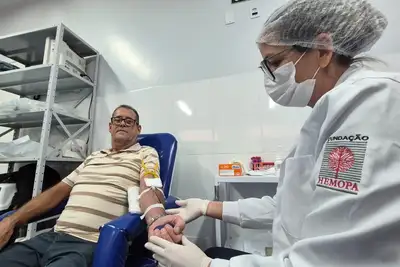Healthy eating from childhood helps prevent obesity in adulthood
This is the message from Sespa on National Obesity Prevention Day
On this Saturday (11), National Obesity Prevention Day, the State Department of Public Health (Sespa) announces the main measures and actions that can be taken by the population from childhood to prevent obesity in the future.
Resulting from the excessive accumulation of body fat, obesity is a chronic and multifactorial disease, influenced by genetics, environment, behavior, and hormonal factors, which increases the risk of diabetes, cardiovascular diseases, and other health conditions. A person is diagnosed with obesity when their Body Mass Index (BMI) is equal to or greater than 30 kg/m².
Thus, Law No. 11.721/2008 established the commemorative date, with the aim of raising awareness about the impact of obesity on people's lives, health systems, and the economy, expanding access to information about the disease and its protective mechanisms.
According to the World Health Organization (WHO), obesity is one of the biggest public health problems, and it is estimated that around 700 million adults worldwide will become obese and 2.3 million will be overweight by 2025.
According to a report published by Agência Brasil last year, the World Obesity Atlas 2024, released in March of that year by the World Obesity Federation, indicated that about one in three Brazilians (31%) lives with obesity, and this percentage is expected to grow in the coming years.
According to the study, 68% of the population is overweight, and of that total, 31% are obese and 37% are overweight. The Atlas also estimates that obesity may increase by 33.4% among men and 46.2% among women.
Data in Pará - According to the Food and Nutritional Surveillance System (Sisvan) of the Ministry of Health in 2024, in Pará, 36.6% of adults had excess weight, with the highest prevalence in the male population (38.4%). And the condition of obesity, which includes part of the individuals, already reached 28.2%.
The problem of excess weight has also affected younger individuals. Among children served in Primary Care, still in 2024, 5.6% of those under 5 years old and 7.4% of children between 5 and 9 years old had elevated weight for their age. As for adolescents monitored during the same period, 18.1% and 9.1% presented excess weight and obesity, respectively.
Children – For the state coordinator of Nutrition, nutritionist Walkiria Moraes, the prevention of obesity should start from childhood, with the formation of healthy eating habits, including encouraging exclusive breastfeeding until six months of age and, from that age, gradually introducing natural foods, with daily offerings of fruits, vegetables, greens, whole grains, and healthy proteins, in addition to reducing the consumption of ultra-processed foods high in sugar, fat, and salt.
She also emphasizes the encouragement of daily physical activities, with outdoor play, sports, and limited screen time. “However, the challenges are complex due to factors such as food insecurity, changes in consumption patterns, and reduced physical activity among the youth. Therefore, the prevention of childhood obesity requires the involvement of family, school, and public authorities,” she stated.
Bernardo Mendes, ten years old, is an example worth following. He is focused on maintaining a healthy diet daily and practicing soccer twice a week. “I don’t want to be overweight because when I grow up I want to be a soccer player for Real Madrid or Barcelona,” said the boy, who has tried soda but has only been drinking natural fruit juice since he was a baby.
According to Walkiria Moraes, the family plays a fundamental role in this process, from buying and preparing food to the type of food offered to the child and how they share and provide the meal. “Although not the only responsible party for the obesity situation among children, the family is at the heart of changing habits and reversing the current epidemic,” she said. “Therefore, the actions of parents and guardians are essential to change bad habits,” she added.
Adults – Walkiria Moraes advises that to prevent obesity, adults should maintain a proper and healthy diet, preferring the consumption of in natura and/or minimally processed foods, such as fruits, vegetables, and whole grains, and avoid processed and ultra-processed foods, which are industrialized foods high in sugar, fat, and salt. They should also engage in regular physical activities and ensure adequate sleep. “Additionally, it is very important to take care of mental health, stay hydrated by drinking at least two liters of water a day, and consult health professionals such as nutritionists for personalized follow-up,” emphasized the nutritionist.
Actions by Sespa – Within the framework of the Unified Health System (SUS), Sespa, through the State Coordination of Nutrition, has supported intersectoral programs and actions. “We conduct training for health professionals in the areas of food and nutritional security, promotion of healthy eating, and disease prevention, and we develop Food and Nutritional Education actions for the population, guiding them on the importance of following the ten steps for healthy eating, promoting health and preventing the occurrence of diseases associated with poor nutrition,” said Walkiria Moraes.
All this work is important, according to the nutritionist, because in recent years, there have been changes in the food consumption pattern of the population, with a decrease in the intake of in natura and minimally processed foods, such as rice and beans, and a preference for ultra-processed foods, which are increasingly present in the diet of people in Pará.
Walkiria Moraes believes that intersectorality leads to a positive outcome in addressing and preventing obesity; therefore, the sectors of Health, Education, and Social Assistance, with their public policies, must act transversally. “We need to stay together and involved in building and strengthening environments conducive to health promotion with actions promoting adequate and healthy eating and the practice of physical activities fostered by the National Food and Nutrition Policy,” she stated.
In addition to the services offered by the Basic Health Network, Walkiria Moraes highlights the Health in School Program (PSE), which brings actions for nutritional assessment, promotion of healthy eating, and encouragement of sports practice. “The PSE promotes joint action between Health, Education, Social Assistance, and Agriculture through the National School Feeding Program (PNAE). State schools, for example, receive technical support from nutritionists to offer balanced meals with regional products, encouraging good eating habits from an early age,” she informed.
“Another important action is at the Peace Factories (UsiPaz), where children and adolescents have free access to sports and health professional services,” reminded the nutritionist.
At the national level, Brazil also has fundamental instruments such as the Food and Nutritional Surveillance System (SISVAN), which monitors the nutritional status of the population and is essential for supporting public policies; the Dietary Guidelines for the Brazilian Population and the Guidelines for Children Under Two Years of Age, which provide clear and evidence-based guidance on healthy eating.
There is also Law No. 13.666/2018, which makes food and nutritional education mandatory in the Basic Education curriculum, strengthening the role of schools as spaces for health promotion.
Treatment - For those who have not been able to prevent severe obesity throughout their lives, the government of Pará offers bariatric surgery through the Zero Obesity Program, which is managed by Sespa and operates at the Jean Bitar Hospital (HJB).
With five years of operation and 2,313 bariatric surgeries performed to date, the Program has been a game changer for SUS patients in Pará, transforming lives, promoting well-being, boosting self-esteem, and creating new perspectives for users.
According to the patient's adherence to treatment, the preparation period for surgery can vary from six months to two years, as the patient needs to undergo clinical evaluation, undergo tests, and have specialized consultations before the procedure.
Those interested in participating in the program must access the Sespa website and perform a self-assessment, including calculating the Body Mass Index (BMI). Patients with a BMI equal to or greater than 40 kg/m², or between 35 and 40 kg/m² with associated comorbidities, are eligible for surgery. After screening, candidates undergo a detailed medical evaluation with a multidisciplinary team.
Know the 10 steps for healthy eating:
1. Prioritize in natura or minimally processed foods;
2. Use oils, salt, and sugar in moderation;
3. Limit the consumption of processed foods;
4. Avoid ultra-processed foods;
5. Eat regularly and mindfully;
6. Buy food in places with variety;
7. Develop culinary skills;
8. Plan the time dedicated to eating;
9. When eating out, prefer freshly made food;
10. Be critical of advertising and information about food.













